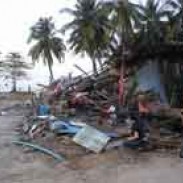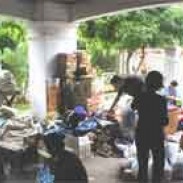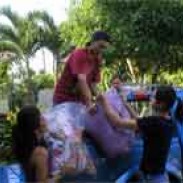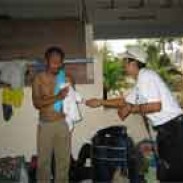You are here
Report on Tsunami Relief Work - Phuket Thailand
Arriving in Phuket, we first went to the city hall which was the coordination center for the relief efforts in the area. The atmosphere there was one of desperation and uncertainty as relatives searched for missing loved ones and rescue teams headed out to the worst hit areas to look for survivors—or more likely, the bodies of those who had perished in the disaster. Bulletin boards lined the driveway and hallways, covered with pictures of those who had not yet been found. Between all of us on our team, we could speak Thai, English as well as the Scandinavian languages so we were immediately called upon to help translate for distraught foreigners who were trying to get information or locate loved ones.
A Swedish man we spoke to was the only known survivor in his family that had been vacationing in Phuket when the wave hit. He was trying to locate his youngest son whose name had been spotted on a list of injured the first day after the incident but had been unable to locate him at the hospitals in the area. By the time we met him he was near exhaustion and desperately needed encouragement. We prayed for him and he thanked us for giving him hope and courage to go on.
After a few hours at the city hall, we went to one of the hospitals in Phuket where many of the survivors had been sent for treatment. We brought our guitar and spent many hours going bed to bed, talking, singing, praying for and encouraging the injured and heartbroken.
It was very moving to hear the stories of those that had lived through the tsunami, most of whom had seen husbands, wives, children and friends swept away by the vicious tide. One woman, bruises and bandages covering most of her body, lost her husband and 5 year-old daughter. Tears flowed from her eyes as she told her story, and clung tightly to us as we prayed for comfort and strength to fill her heart. Another man had lost his wife and 2 sons to the waves and confided that he was going crazy with worry, guilt and despair. We spent some time talking with him and gave him some encouraging material to read as well.
We met a couple who had been working on a construction site in one of the worst hit areas and all of their friends had perished. Their livelihood was gone, but they were thankful to be alive. We sang a song in Thai and they listened intently to the words which spoke of peace after the storm, and we prayed together afterwards that God would give them the strength to start again and rebuild their lives.
One girl sat on her bed staring blankly, still in shock after her traumatic experience. She had been sleeping in the staff quarters at one of the resorts on Phi-Phi Island when the waves came and the building she was in collapsed on top of her. It was 6 hours later before rescue workers were able to pull her from the wreckage—she was one of the only survivors from that resort. When we talked to her, which was 2 days later, she had not yet regained the use of her legs. We were the only visitors that she had received since her ordeal and she was so thankful for the time and encouragement we gave her. Before leaving, we prayed with her and she smiled for the first time as we waved goodbye.
The next day we headed out to Phang-Nga province, 3 hours north of Phuket—the scene of the worst devastation with the highest number of casualties in Thailand. A friend of ours in Bangkok had put us in touch with Khun Tip who owned a resort in Phuket--that is, until the morning of December 26th when it was completely destroyed. She and her husband, a doctor at the local hospital, were organizing the distribution of supplies to some of the areas which were most heavily hit, but which had received little aid as yet. Many of the local villagers had fled into the nearby hills, refusing to return to their homes—or what was left of them—fearing more waves.
We arrived at Phang Nga with several pick-up trucks loaded with as much goods as possible. Khun Tip and her husband arrived with another 2 trucks and we set out, a convoy of 7 vehicles, to a fishing village where about 90% of the houses had been destroyed and approximately 3,000 lives had been lost. Some of the goods were distributed to the people there and we also distributed many tracts and Posters.
We then boarded a ferry to a small island called Goh Koh Kow where many of the resorts had been completely destroyed, most having disappeared into the ocean. The villagers had taken refuge at a small school situated a few kilometers inland. When we arrived with our boxes of goods, they flocked around and gratefully received the bags of rice, clothing, and other items we had for them.
We found one man in front of his house—one of the few that was still standing—digging in the sand trying to salvage what he could of his and his children’s clothing. He told us that, although there was nothing left in his house, he was grateful that none of his family had been lost, and was so thankful for the supplies that we gave him.
Lek lost everything when the waves swept into the fishing village. His children died, his house is no more and his boat is ruined. He was completely devastated and didn’t know what to do with his life now. He said,” Maybe the government will give me a new house, and maybe I can even get a new boat. But even the fish are gone now. What can I do?”
When we arrived at one village to distribute clothing, we found that most of the village had been completely destroyed, and the survivors had nothing left. One man was looking through the mud that now covered the ground to try to recover some of his clothes. We barely had time to open the boxes of clothes that we’d brought before they were empty. People were so desperate and so grateful for what we had brought.
In the same village, we talked to Udom who had gone fishing in a nearby lake when he heard the commotion and saw water from the tsunami flooding everything. He rushed back to the village, but his wife and 2 children, his house and possessions were all gone. He had nothing left but the clothes he was wearing.
Back in Phuket, a taxi driver told us it was his first day of work after the floods. He had spent the whole week cleaning out his house and getting set up again. His house was only partly ruined but completely filled with mud and debris. His wife had been in their little restaurant on Patong beach when the waves hit. She was knocked over and was trying her best to stay afloat. Then she saw a car getting pushed by the waves and coming right at her. She was sure she would die. But the car struck a tree and she survived even though she was seriously injured and needed hospitalization. Their four year old son, who was usually at the restaurant with his mother was visiting his grandfather and was safe.
Throughout the 6 days that we spent in Phuket, we were able to visit the injured in several hospitals, delivered two 6-wheel truck-loads of supplies to the local people, including sheets, blankets, shoes, clothing, toiletry items, mosquito repellant, rice, instant noodles, rice cookers, pots and pans, fans, drinking water, books, bags and suitcases and much more. We distributed 2,400 tracts, 400 posters, and countless smiles, prayers, and words of comfort to hundreds of people along the way.
We’re planning to make a return trip to Phuket in the next few days and will probably spend a week or so working at a social welfare shelter set up for children who were orphaned as a result of the tsunami. We plan to continue offering our support, time and efforts in the long-term as there’s a lot to be done and recovery will likely take years. Aside from the physical tasks of rebuilding homes and livelihoods, there is the much greater task of healing broken hearts and bringing back lost hope to those whose lives were so suddenly torn apart. We very much appreciate your support during this difficult time in Thailand’s history. We are very grateful for all of your help which is making our efforts possible. Thank you so much!






